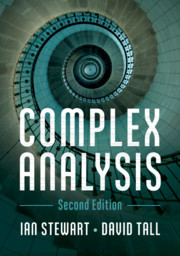Description
Complex Analysis (2nd Ed., Revised edition)
Authors: Stewart Ian, Tall David
A new edition of a classic textbook on complex analysis with an emphasis on translating visual intuition to rigorous proof.
Language: English
Subject for Complex Analysis:
Publication date: 08-2018
402 p. · 17.5x24.7 cm · Paperback
402 p. · 17.5x24.7 cm · Paperback
Description
/li>Contents
/li>Biography
/li>
This new edition of a classic textbook develops complex analysis from the established theory of real analysis by emphasising the differences that arise as a result of the richer geometry of the complex plane. Key features of the authors' approach are to use simple topological ideas to translate visual intuition to rigorous proof, and, in this edition, to address the conceptual conflicts between pure and applied approaches head-on. Beyond the material of the clarified and corrected original edition, there are three new chapters: Chapter 15, on infinitesimals in real and complex analysis; Chapter 16, on homology versions of Cauchy's theorem and Cauchy's residue theorem, linking back to geometric intuition; and Chapter 17, outlines some more advanced directions in which complex analysis has developed, and continues to evolve into the future. With numerous worked examples and exercises, clear and direct proofs, and a view to the future of the subject, this is an invaluable companion for any modern complex analysis course.
Preface to the first edition; Preface to the second edition; The origins of complex analysis, and its challenge to intuition; 1. Algebra of the complex plane; 2. Topology of the complex plane; 3. Power series; 4. Differentiation; 5. The exponential function; 6. Integration; 7. Angles, logarithms, and the winding number; 8. Cauchy's theorem; 9. Homotopy versions of Cauchy's theorem; 10. Taylor series; 11. Laurent series; 12. Residues; 13. Conformal transformations; 14. Analytic continuation; 15. Infinitesimals in real and complex analysis; 16. Homology version of Cauchy's theorem; 17. The road goes ever on; References; Index.
Ian Stewart, FRS, is Emeritus Professor of Mathematics at the University of Warwick. He is author or co-author of over 190 research papers and is the bestselling author of over 120 books, from research monographs and textbooks to popular science and science fiction. His awards include the Royal Society's Faraday Medal, the Institute of Mathematics and its Applications (IMA) Gold Medal, the American Association for the Advancement of Science (AAAS) Public Understanding of Science Award, the London Mathematical Society (LMS)/IMA Zeeman Medal, the Lewis Thomas Prize, and the Euler Book Prize. He is an honorary wizard of the Discworld's Unseen University.
David Tall is Emeritus Professor of Mathematical Thinking at the University of Warwick and is known internationally for his contributions to mathematics education. He is author or co-author of over 200 papers and 40 books and educational computer software, covering all levels from early childhood to research mathematics.
David Tall is Emeritus Professor of Mathematical Thinking at the University of Warwick and is known internationally for his contributions to mathematics education. He is author or co-author of over 200 papers and 40 books and educational computer software, covering all levels from early childhood to research mathematics.
© 2024 LAVOISIER S.A.S.




